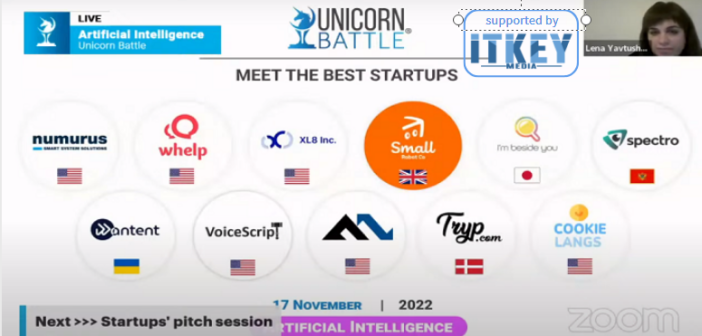- AI Unicorn Battle Q4 2022 determined the final participant for the CUP Finals
- 11 startups competed for the attention of judges
- AdviNOW Medical won by a fairly close margin
The AI Unicorn Battle took place on November 17th. It was the eighth and final industry-specific entry in the Unicorn Battles Q4 2022 series, following the NFT & Crypto Battle, the Robots & Hardware Battle, the HealthTech & BioTech Battle, the eCommerce + Logistics + Delivery Battle, the Industry Agnostic Battle, the Fintech Battle, and the Software & Services + Data Management Battle. This battle determined the final contestant in the lineup of the nearing Unicorn Cup Finals that will take place as soon as December 1st.
The evening’s co-hosts were Unicorn Events’ CEO Anna Fedorova and head of Startup Battles Asia Lena Yavtushenko. After they announced the event’s main sponsors – Network.VC, Silicon Valley Syndicate Club, and Startup Inc., the Battle’s judges had a few moments to introduce themselves. This time, the Judges lineup consisted of:

Panel of Judges at Unicorn Battle AI Q4 2022
- Alexander Soroka, CEO at Network.VC
- Michal Lasocki, partner at EEC Ventures (Poland)
- Gaurav Shah, managing partner at Arete Ventures (India)
- Kelly Luo, founder and investor at Mans International (Canada)
- Steven Yung, managing partner at Glocal LLC (Hong Kong)
- Walied Albasheer, managing partner at Intuitio Ventures (The UAE)
- Angelo Burgarello, director of business development and partner at AI Startup Incubator (Czechia)
- Nurul Hai, VP at SEAF (Bangladesh)
The expert board and the business angel also got their chance to vote and confluence the outcome of the battle. 11 startups took 5-6 minutes each to pitch themselves and answer the questions from the audience, after which the latter took a few more minutes to finalize their votes. When the voting was over, it was announced that the winner of the Unicorn AI Battle was AdviNOW Medical with Small Robot Company and Numurus following closely behind. Their winning pitches went like this:
Numurus

Jason Seawall, CEO at Numurus
Jason Seawall, the startup’s CEO, worked in robotics his entire career. He started Numurus in 2017 to address some of the challenges that accompany new robotic products. More specifically, every robot requires lots of special software to operate, including tools for managing the AI. At that, there is no operating system on the market that would specialize in robotics, and every company must develop the whole software package for their robotics products itself.
Numurus’ solution is NEPI – a Linux distribution that brings all the AI management and middleware software together. It is equally suitable for smart sensors, AI, robotics, and robotics services. The company’s ambition is to become the industry standard software for robotic solution developers.
Small Robots Company

Ben Scott-Robinson, Co-Founder and CEO at Small Robots Company
This British startup aims to revolutionize wheat farming. According to its co-founder and CEO Ben Scott-Robinson, cereal farming is suffering from threats at the moment, including chemical waste, contribution to climate change, and this year’s military turmoil in one of the world’s main wheat-supplying regions.
Small Robot Company tackles it with light-weight autonomous vehicles with an AI operating system, that replace tractors and deliver ‘per plant farming.’. Mr Scott-Robinson insists that it optimizes crop care, reduces chemical waste and emissions, and also reduces the cost of farming while also increasing yield. Among other things, the AI-powered vehicle provides a real-time view of each plant as it grows through the season.
AdviNOW Medical

James Bates, Founder and CEO at AdviNOW Medical
The startup’s founder and CEO James Bates began by pointing out that physicians spend about ⅔ of their time doing administrative work. Moreover, these protocols increase in number, and the situation is getting worse. This makes medical workers resemble actual robots and leads them to massive amounts of burnout or even quitting healthcare altogether.
AdviNOW Medical takes over all the administrative processes in the clinic all along the patient’s journey. Medical workers, in the meantime, can dedicate their attention to the patient. More specifically, AdviNow allows doctors to double the number of patients they are seeing – according to Mr Bates. This is done through two applications: the patent-facing one (digital front door) and the provider-facing one (collecting documentation and providing initial differential diagnosis).
Other pitching startups were:
- Whelp – an American customer support chatbot provider
- XL8 Inc. – an American media transcription and machine translation solution provider
- I’mbesideyou – a Japanese video communication enhancer
- Spectro – a Montenegrin fire detector provider
- Wantent – a Ukrainian content efficiency evaluator
- VoiceScript – an American court reporting transcription provider
- Tryp.com – a Danish travel advising service
- Cookie Langs – an American language learning platform
You are welcome to check out all the pitches in full here.

Kostiantyn is a freelance writer from Crimea but based in Lviv. He loves writing about IT and high tech because those topics are always upbeat and he’s an inherent optimist!





